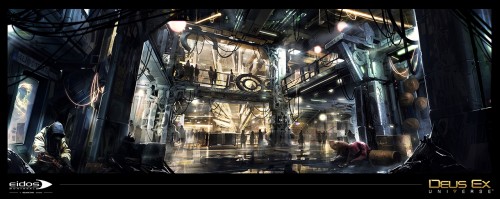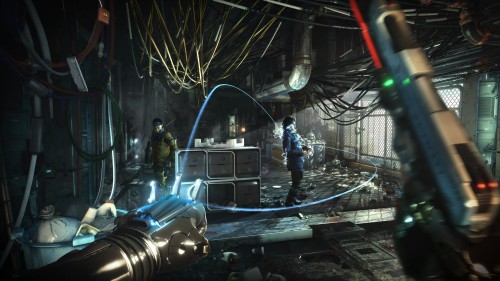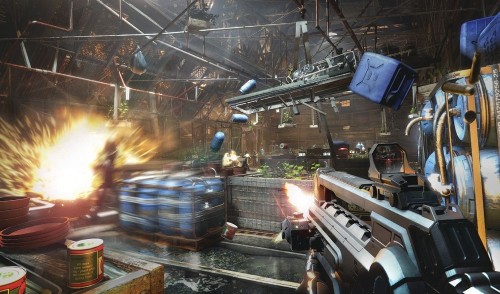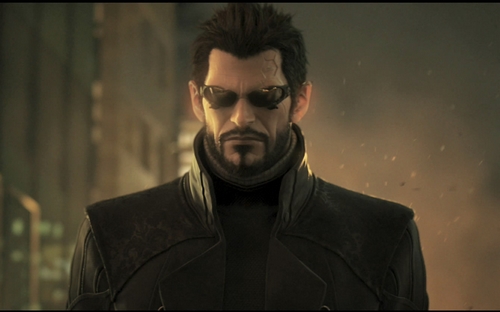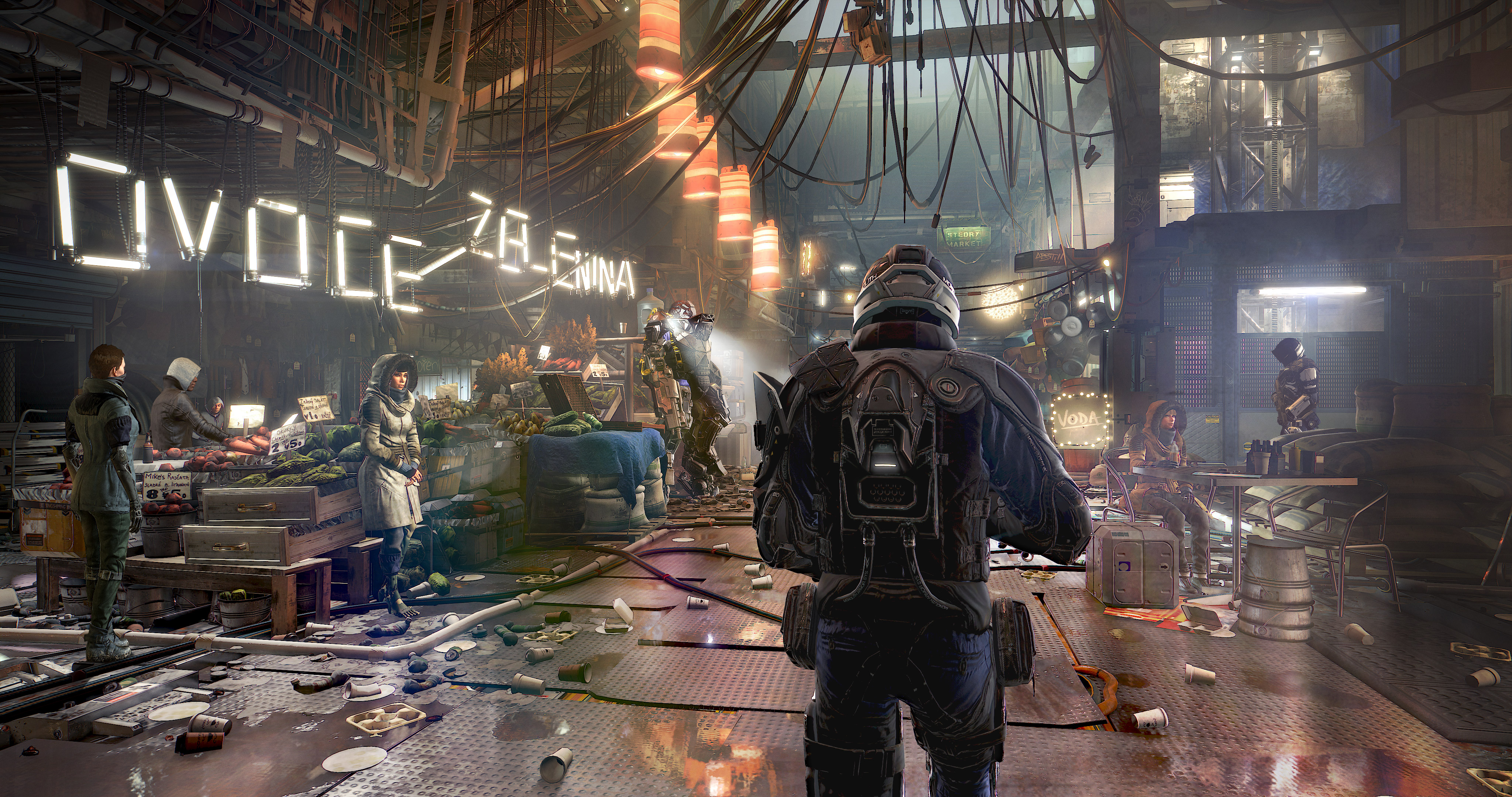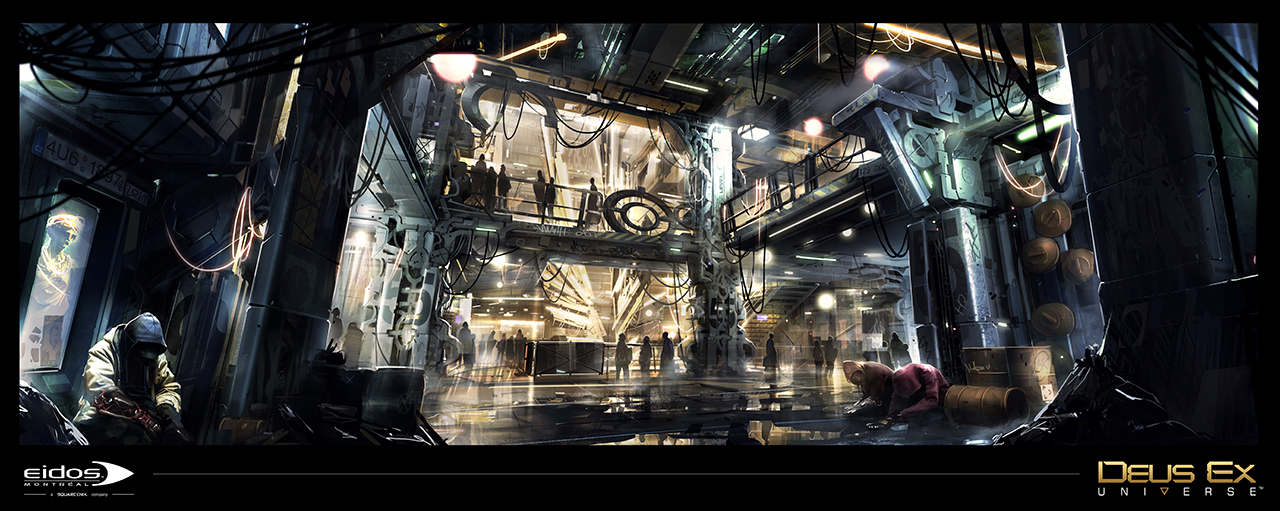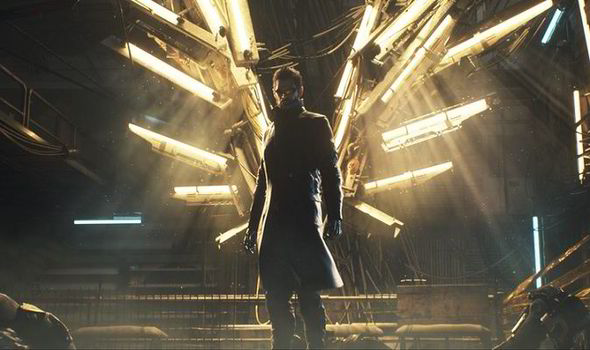
Deus Ex: Human Revolution could be considered one of the biggest surprises of the last generation. At least, it was one of mine. A decently faithful revival of an iconic series most had given up on, and both a critical and commercial success. Enough to warrant a sequel early next year in Deus Ex: Mankind Divided.
As we all patiently wait for the sequel, I had the opportunity to sit down with Mary DeMarle, lead writing of both Human Revolution and Mankind Divided, to discuss the ins-and-outs of writing multiple narrative paths and moral ambiguity in a massive action role playing game. Read on!
Jarrod Mawson: Starting off, Human Revolution was deeply rooted in a “cyber renaissance”. How is Mankind Divided extrapolating on and developing those themes?
Mary DeMarle: Well, with the cyber renaissance in Human Revolution it was based on the fact that people were mechanically augmented and it was the dawning of a new age. Transhumanism, the golden age. Because of the way Human Revolution ends, the golden age is over. And the world is starting to fall into more of a chaotic, terror ridden time. So there are still vestiges of the cyber renaissance that are in the game, but we’re starting to see a lot more of what we’re calling corporate feudalism. And it’s kind of a return to the colder, darker…
Jarrod: A bit like a fallout, an end to the wondrousness…
Mary: Yes! And now it’s all becoming brutal, this is reality now.
Jarrod: So are these the core themes being explored in Mankind Divided?
Mary: Yeah, certainly I think from, and I’m not going to speak too much on it because I’m not the art expert, but thematically ‘art wise’ there are going from the cyber renaissance towards the corporate feudalism kind of thing and we’re starting to see more of the blue overtones of the original game coming through. Thematically, story wise, we’re still always looking at transhumanism and the central question of “What does it mean to be human?”. In Human Revolution it was kinda looking at “Why do we do the things that we do?”, and it was all about control, everybody needs to control something in their life. But now it’s looking more in terms of “What does it mean to be human?”. And when the world is starting to fall apart there’s a lot of chaos, when there’s opportunists coming to the floor to take advantage of things, how do we react to that? How do we build on that? Do we handle it more with our emotions, or do we handle it more with our reason? How do we find balance in a world that’s spinning out of control?
Jarrod: I find the concept of transhumanism in Deus Ex to be really interesting, because the series deals with so many other more…pulpy things. Like the Illumanti. But transhumanism is a very real thing. Is that something you’re personally interested in?
Mary: I come from a very scientific family. My father, he was…actually he was a future forecaster. He was always looking at where technology was going. Back when VCRs first came out he predicted very accurately how quickly they would penetrate the market. So I come from that kind of background and science and stuff is really interesting to me.
Jarrod: I suppose something like Deus Ex requires plenty of research.
Mary: Yeah, exactly. When we were working on Human Revolution it was really interesting to pursue all that kind of transhumanism research.
Jarrod: One of my favourite details in Human Revolution are the pills Adam is taking…
Mary: Oh, the neuropozyne?
Jarrod: Yeah! The actual chemical composition and reaction it has on your body is accurate, in terms of helping the body adapt to transplants. I thought “these guys know their shit!”
Mary: We were lucky, because we worked with a science expert who could help us with those details. That being said, on the question, I have to admit being a little bit wary of new technology. I always hate it when my computer breaks down, because I’m not the techy who can fix it.
Jarrod: I suppose that’s reliance on a tool, but when it crashes your power is stripped away.
Mary: You feel vulnerable. And those are interesting things to explore when you’re talking about merging man and machine.
Jarrod: Is that something Mankind Divided will look at?
Mary: There may be touches, but we’re really more dealing with the segregation, and the kind of chaos from it.
Jarrod: With something like Deus Ex you have so much narrative written, constructed, like Adam Jensen as a character who has relationships and is taken through scenarios. But Deus Ex, as a video game, is a series built where there’s a lot agency in how you act and behave. As a writer is it difficult to reconcile constructing narrative that is deeply focused, with the reality that players can do whatever they want?
Mary: There’s definitely challenges inherent in it. When we created the character of Adam Jensen…within the game industry there’s always the debate “Should the main hero be an avatar, blank slate that the player decides? Or should they be a fully fledged character who is your friend, that you’re guiding on a journey?” And for us, when we started, we looked at that and we said we’d like to see if we could do a little bit of both. We’d like to have a character who has a strong background, strong character traits, strong history, strong personality. Somewhat rooted in the world. And yet has something happen to them in the beginning, and when that happens they become a blank slate and it’s the player who gets to guide them. So we can use the personality traits that we decided for him to keep him on a focus, but allow him to do whatever the hell the player wants. And you can take that character and you can make him a serial killer.
Jarrod: Yeah, the serial killer…as you’re playing Adam Jensen, you’re embodying this character, and through a mission you could be somebody who is very patient, chooses not to kill, careful and methodical. Or you could be a total nutbag, punching and killing your way through. I imagine that’s quite difficult to balance from a narrative perspective?
Mary: It is, but it isn’t. Because we’re really looking at it as…you have to look at it less as the authorial vision, like you get in film and television. And it’s really more about, let’s look at storytelling in terms of; we know our plot, we know our beats you have to get through, we know the character has to get there. And we let the player do it. Then we use the rest of the world to reflect on what the player is doing in a non-judgemental way. We don’t want to judge you, we want to show the consequences of what you’ve done. So we can have things like, for instance, you go through and you kill everybody. And then you have a newspaper pop-up, or you’ll have people who know you respond. It’s recognising your behaviour, calling it back to you. And some of the people might judge you for it. Like a character in the game might sit there and say “I can’t believe you killed everyone, that’s terrible”, then maybe there’s another character who’ll say “You killed them all? They deserved it.”
Jarrod: Some of the poorer writing you see in games…it’s very arbitrary. Very binary. Good is good, evil is evil. Do you look for creative ways to, in your stories, where for example a player might be playing the pacifist, being the “good guy”, but there might be consequences that they didn’t expect?
Mary: Absolutely. With our license, we say it isn’t about black and white it’s about shades of grey. Because life is shades of grey. I’ve often said we need to be very aware, as the writers, as game developers, that we’re not judging you for your actions. And we’re not saying “Oh, you’re always getting complimented for the good things you do”. It has to be that you can help someone and they could slap you in the face for it. I often tell the story that I remember in my own life, where I was travelling in Greece and I was at the airport and, you know, people have spare change. And I saw this couple come in, they were travelling and they had spare change, and there was this Greek cleaning woman and they were like “Here! You can take this, we don’t need it”. I was watching this whole thing happen. They gave it to her because they couldn’t use it, and they walk away feeling proud of themselves, but what they didn’t see is that she spit at them as they walked away. So we constantly have to think about those moments.
Jarrod: It’s less about having the story revolve around the player, and more about making them feel like they’re part of a world where everybody has a distinct personality.
Mary: Exactly.
Jarrod: Working on such a big production like Human Revolution, and then Mankind Divided which I’m sure is bigger again, what are some lessons learned? I remember going through Human Revolution with the director commentary, and in the final stage you mention that it didn’t pan out quite as intended simply due to the logistics of game development.
Mary: That’s a good question. What are the lessons that we learned? For me, from narrative perspective, and I don’t know if I’ve yet figured out how to do it…but I did feel that the boss battles, I mean everybody complains about the boss characters from a gameplay standpoint, but from a narrative standpoint we built these massive back stories for these really well developed characters but we didn’t reveal any of it in the game. Because it’s all told from Jensen’s perspective, so how can we? So one thing I was looking at was how we could make more defined characters, and try and find ways to present that better. Moreso one of the things I wanted…I was looking for bigger challenges. So for me it was like the story for Human Revolution was somewhat linear. It did have moments of choice, but it was still a straightforward arc. This time around I was like “I want to play with that”, I really want to put choice and consiquence in. So I want to make it that things you do, from the very beginning, all throughout impacts the ending.
Jarrod: You mention that for the final stage of Human Revolution, where you had ideas for how you treated characters would impact how quest arcs played out, but due to time and budget…
Mary: Yeah, we had to cut it all back. So I want to keep pushing on that, I think on Mankind Divided. You guys will have to play and let me know if we succeeded. We did manage to get things where like midway through the game there’s a pivotal choice you have to make, you cannot do both, that changes the story. Your perception of it changes and all that. And the ending, things you do early on will change the choices you have. With side quests, definitely, we have things where you can choose to do certain things in side quests and depending on how far you want to go with the side quest it could then come back an impact the main story.
Jarrod: I liked the side quests in Human Revolution, but they were very much small side arcs rather than woven into the main quest.
Mary: Yeah, so now we want to try and find ways to bring them back and add more life to things. I still want to keep pushing and exploring what we were just talking about, where how you treat characters early on leads to all kinds of reactions. Hopefully we’ve succeeded with some of that stuff in Mankind Divided.
Jarrod: Wonderful. Thanks for taking the time to speak to us, and good luck with the game.
Deus Ex: Mankind Divided is currently slated for a February 23rd. 2016 release on Xbox One, PlayStation 4, and PC. We’ll have more on the title as we get closer to release.

